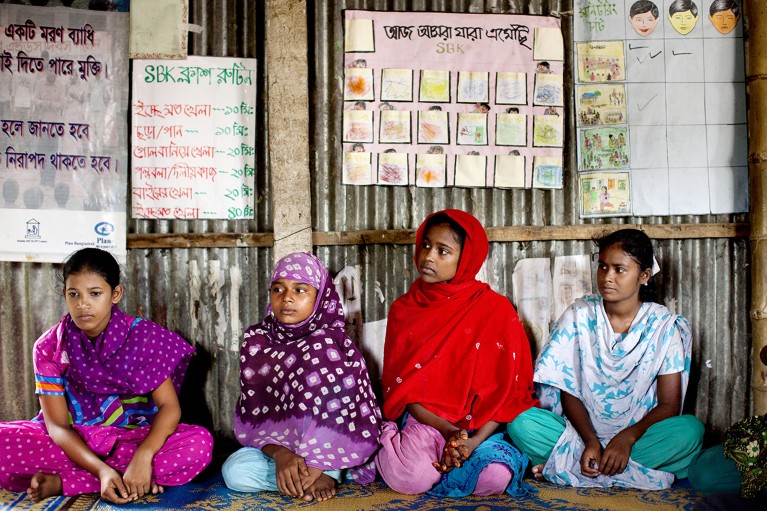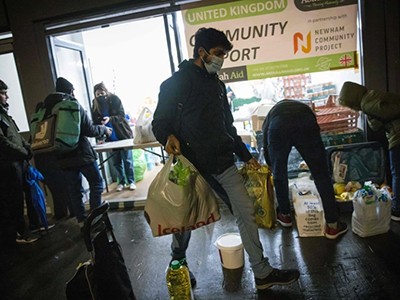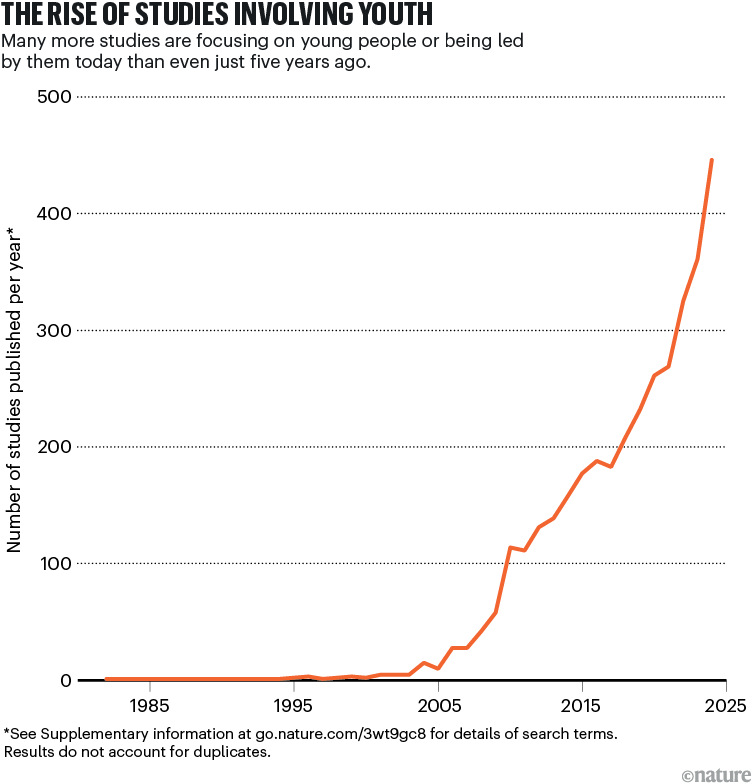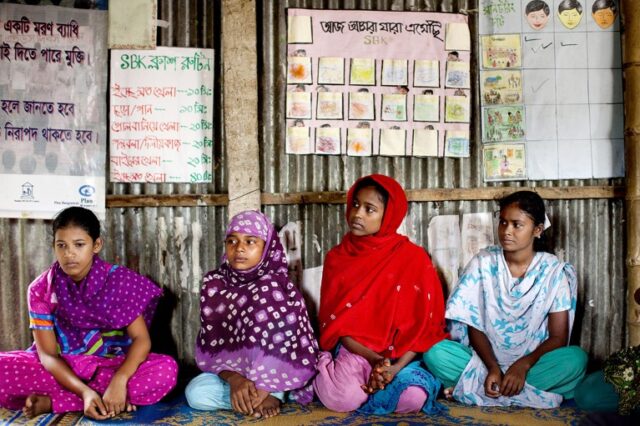
Members of a children’s group in Bangladesh, which is run by young people and helps to protect others in the community from child marriage.Credit: Suzanne Lee/Panos Pictures
Young people have become increasingly involved in research in recent years — whether in relation to social and environmental issues, health and well-being, education, economic development or policy and advocacy. Several major funders, such as the US National Institutes of Health, UK Research and Innovation and the Canadian Institutes of Health Research, have focused on adolescent health in their calls for research, for instance.
Added to this, young people — defined for these purposes as individuals aged between 12 and 24 — are more often acting as advisers or co-researchers on projects, not just as research participants1. Indeed, among governmental and non-governmental organizations, foundations and international funders, support has been growing for an approach known as youth-led participatory action research, which strives to shift the conventional balance of power2. In such projects, instead of adults instructing young people, young people identify the research questions and collect and analyse data themselves.

The scandal of researchers paid less than a living wage
This involvement and leadership — driven by a growing recognition of the unique perspectives that young people can bring to research — has yielded all sorts of benefits. A collaboration between two youth-led organizations, for example — Canada’s Youth Climate Lab and Ghana’s Green Africa Youth Organization — resulted in more than 200 youth activists from Asia, Africa and Latin America developing policy recommendations for climate adaptation and mitigation in 2021. These were presented at COP26, the United Nations climate-change conference in Glasgow, UK. From 2017, young people aged 12 to 17 in a Bangladeshi community used their research on birth certificates to boost registrations of births3. Over the next three years, the young researchers and their peers helped to block more than 70 child marriages by proving that the bride was under age4.
We applaud the growing number of efforts to involve young people in research (see ‘The rise of studies involving youth’). Over the past decade, we have been involved in the International and Canadian Child Rights Partnership, a global initiative led by Toronto Metropolitan University, Canada, that is focused on children’s rights to protection and participation in research. We have also conducted case studies of child and youth activism on issues such as climate change, mental health, peacebuilding and vaping, in countries including Brazil, Canada, Colombia, South Africa and the United Kingdom.

Source: Analysis by N. A. D’souza et al.
But the increased inclusion of young people in research poses new challenges. All four of us — with collective experience spanning more than 30 years — have been working with university research ethics boards and assessing how they deal with the inclusion of young people in research. We see a tension between those who are pushing for the empowerment of young people in research, such as researchers and funders, and research ethics and oversight bodies at universities, schools and hospitals. These bodies tend to classify people under the age of 18 as ‘vulnerable’ and in need of special care and protection. In particular, studies are raising ethical and practical challenges around how to recognize and compensate young people for their participation in research.
Here, we highlight three issues in this space that more researchers need to think through.
Is the compensation appropriate?
Compensation typically takes the form of fixed monetary payments, gift cards or vouchers. It can also include scholarships, opportunities for developing a skill, mentorship programmes or resources, such as library books for participants or their communities. Compensation — which goes beyond just reimbursing people for food, transport or other costs — shows young people that their contributions are valued. It can also be crucial to enabling some young people to participate, especially those from low-resource settings.
A key goal of university ethics boards is to evaluate researchers’ proposals around compensation and ensure that young people join studies without being overly influenced by the need to make money or to gain some other resource.

Young people on a fishing trip organized by a local youth centre in Nain, northeastern Canada, which has a large Inuit population.Credit: Melissa Renwick/Reuters
These concerns can be difficult to navigate in practice, however. Researchers must be mindful that compensation should be proportionate: a US$25 gift card might be appropriate for a 15-year-old, but could seem like a fortune to a 7-year-old living in the same location. It should be adjusted on the basis of each co-researcher’s economic and social situation to ensure that compensation is fair and respectful, without being overly influential. Another, often-overlooked complexity is associated with the need for carers to consent to younger children’s participation in a study. If carers receive and manage compensation on behalf of their child or ward, they could end up pressurizing children to participate in research. All types of compensation come with the risk of creating expectations and dependencies5.
How to compensate young people who are both participants and researchers in a study also remains relatively unexplored. Sometimes, it is not clear whether young people are actively shaping the research or acting only as participants, particularly when projects stretch over years and people’s motivations and roles change. To address this challenge, adult researchers should first clearly define the role of the young person in a project. They can then collaboratively decide with young people what appropriate compensation looks like. Regularly revisiting the compensation plan during the study will ensure that it remains fair and relevant, particularly for long-term projects.
Is the compensation sensitive to socio-economics and culture?
One of us (M.R.-C.) authored a 2010 social-science study6 that aimed to map the support networks of family units headed by children in northern Namibia. However, children in the intended study group, who were living on the streets, declined offers of money or material goods, such as maize (corn) meal and soap, because they were worried that other people would try to steal them. In the end, the researcher invited the participants to share a meal and spend the day playing games.

‘Getting paid to review is justice’: journal pays peer reviewers in cryptocurrency
In our experience, perceived inequities in compensation can be a source of considerable tension, which must be lessened by transparency and open communication. Meanwhile, in countries such as the United Kingdom and Canada, receiving monetary compensation in research can affect young people’s eligibility for welfare benefits. In these cases, researchers should provide potential participants with clear information on payment options and encourage them to seek advice on how pay might affect their benefits (see, for example, go.nature.com/4jrbfpf).






